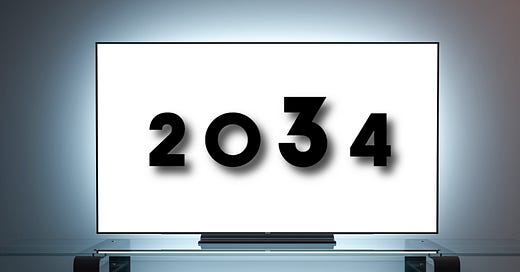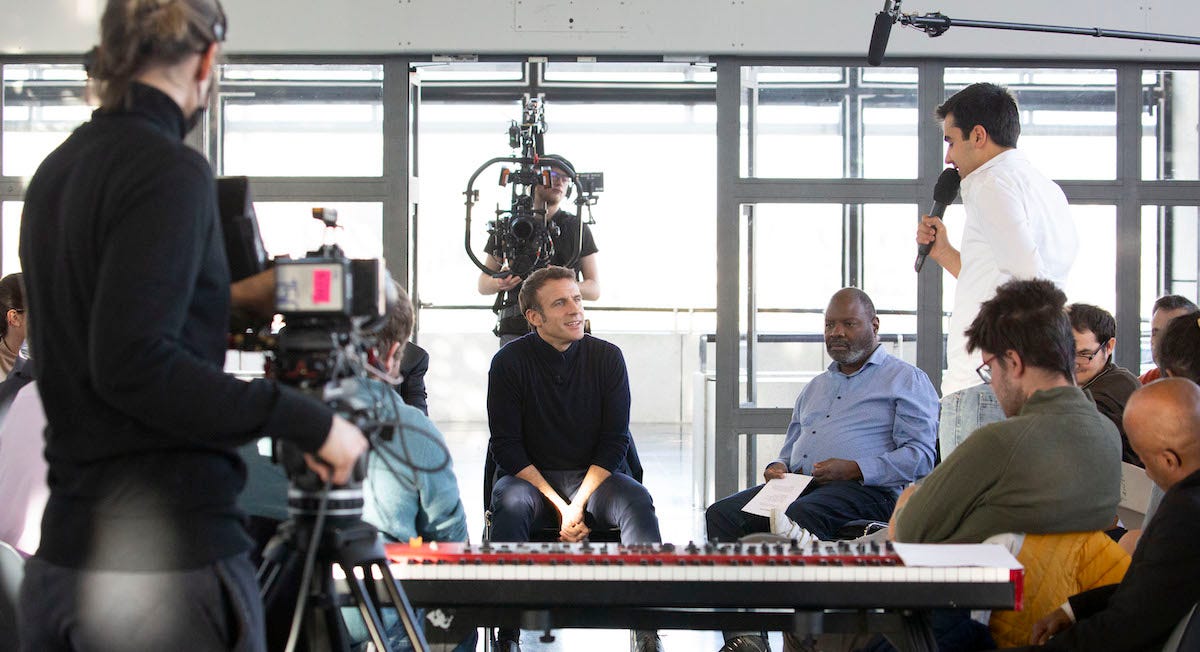TELEVISION 2034: what will the TV landscape look like in 10 years?
A brand-new English digital format - two Australian inclusive formats
There are many who try to predict what will happen from one year to the next, but hardly anyone about the next decade. The reason for this is that it is impossible to know exactly what the audiovisual system (let alone the world as a whole...) will look like in ten years' time. The tremendous changes - technological and social - of the last period are only a foretaste of what will happen in the near future. We have arrived at one of those turning points that periodically mark a 'before' and an 'after', mark the epochs and turn the tables in every sense.
It is too early to say which direction this radical change will take: the data we have are not yet sufficient. While some developments are well known and fairly predictable, others are much more difficult to hypothesise, because it is not certain that what is unfolding in this period will follow a linear path. The following should therefore be taken for what it is: a simple game. But perhaps it can provide some interesting insights...
So this is what the audiovisual system could look like in 2034, from the point of view of the overall scenario. In next Friday's Espresso we will talk about the contents of the future!
TELEVISION 2034 - part one: the ‘digital jam’
Although traditional broadcasters television has not yet disappeared completely (it may do so in the next decade), the vast majority of viewing is streaming (but for consumption of medium and long-form media content, TV remains firmly in the lead). To describe this scenario, the most appropriate expression is ‘digital jam’: a flood of content of all kinds available online, in which it is easy to get lost and waste endless time searching for what you want to watch.
To partially solve this problem, all devices are equipped with EPGs with an advanced AI facial recognition system (which, of course, knows everything about me): it will suggest the most suitable content based on my previous interests and my current mood ("Tonight, dear Axel, I can see that you are a little down, so I suggest the romantic comedy that you liked so much when you were young...").
In any case, the ‘digital jam’ is not a completely undifferentiated, limitless mass, because within it there is a division, and a fairly clear one: that between the - relatively few - channels with ‘rich’ content (high budget) and the vast majority of channels with ‘poor’ content (low and very low budget).
The first group includes channels/networks/bundles/conglomerates that have managed to gain a competitive advantage over the competition during the very delicate transition period and therefore have a fairly large and loyal reference audience (in the sense that viewers appreciate and identify with their offerings and therefore tend to stay within the familiar and reassuring confines of their boundaries, rarely venturing into the 'digital jam').
This group includes a dozen or so ‘global players’ (some of them from the technology sector, which is set to expand and increasingly colonise the audiovisual world), present in almost all the countries of the world, albeit in varying proportions, but sharing their leadership with ‘historical local players’, strong and established in a single country or group of countries.
The second group includes all the rest of the offer (a huge, heterogeneous galaxy of different actors: small channels, commercial brands, content creators, organisations and associations, temporary channels, prodcos channels...), which can count on a very large audience in terms of numbers (the world's population is still growing and everyone needs to consume audiovisual products), but which is fragmented and has little or no loyalty: the practice of content surfing is compulsive and incessant, and the audience has to be conquered each time, with each single product. Hard work: but if you happen to get the right content, the profits can be enormous.
The economic models and viewing patterns are more or less the same, with an offer that mixes (in slightly different proportions) advertising and paid subscriptions, alternating between flow (FAST) and on-demand viewing. In the 'poor' group, on the other hand, the free model (AVOD) predominates, with some single premium paid content.
This dichotomy is also reflected in the markets, which will be reduced by natural selection over the next few years. Half a dozen (perhaps) will survive, aimed at the elite of 'rich' operators, with exclusive suites and venues equipped with every comfort (yes, I am thinking of the London events ; ), to which will be added a series of other fragmented and specialised markets (by genre, micro-genre, geographical area and purpose). Here too, although they can no longer be defined as ‘global’, those who find the right formula, useful to a homogeneous group of operators, can build a space that is anything but marginal.
To be continued in the next issue…
DIGITAL BOOST FOR NEWBIE ENTREPRENEURS
The digital strategy of the UK platforms (and others) continues to offer original content. In particular, Channel 4.0, Channel 4's digital brand, has announced the commissioning of new series Boss Pitches with Nella Rose (who previously hosted her 'airport game show' Nella Rose's Flight Mood, always on Channel 4.0) and GK Barry, produced by BBC Studios Entertainment.
The two internet personalities (they have a combined social media following of 6.3 million on TikTok and Instagram) meet with celebrity guests willing to lend their viral cred to new entrepreneurs looking to boost their social profiles. A satirical take on the stereotypical male-dominated boardroom, this post-Barbie series turns traditional 'suit and tie' business formats on their head.
While we wait for the inevitable digital switchover, this is the way forward…
AUSTRALIAN INCLUSIVE FORMATS
One of the most interesting recent trends in unscripted is what we have called 'formats for a better world'. This definition includes formats that address ethically and socially sensitive issues such as climate change, sustainable fashion, conscious consumption… and of course formats about inclusivity in all its forms: from the ‘classic’ UK's The Restaurant That Makes Mistakes (2019) to the recent Finnish success Kirjolla.
Now ABC (Australian Broadcasting Corporation, the Australian national public television network) reveals that, among the 10 new content announced to 2024 slate, two of them belongs to this trend.
The first is The Assembly, local remake of the French hit format The A Talks (pic). The concept is simple: in each episode, a celebrity (actor/actress, singer, TV presenter, sportsperson, politician...) faces a group (30 in the case of the French version) of people with ASD (Autism Spectrum Disorder). All have different personalities, but they have one thing in common: a disarming naturalness that allows them to ask surprising, unpredictable, sometimes funny or poignant questions.
In this way, the guests naturally drop their masks and each meeting becomes a magical moment, out of time, full of emotion, laughter, poetry and impertinence. In the Australian version, the Prime Minister has already confirmed his presence on the program.
The second one is an original format, Headliners. The Australian singer Elly-May Barnes leads an ambitious quest to create two bands made up entirely of musicians living with disability. With support from Australian music royalty including her rock legend Dad, Jimmy Barnes, they’ll transform a group of strangers to must see acts on the main stage at a sellout iconic live music event in just 7 weeks.
NEWS IN A NUTSHELL
Critical Content has announced a new lifestyle series with A&E, New House No Debt, which is set to premiere on the network’s Home.Made.Nation daytime programming block
Netflix has recently announced a brand new reality property show, Buying London: the UK is officially added to the roster of reality shows focused on OTT mansions and chaotic drama, following in the footsteps of Selling Sunset (currently in its seventh season) and its numerous spin-offs
Drag Race producer World of Wonder is about to launch the factual series House on Fire (following the preeminent 'house' in the New York ballroom scene, the House of Miyake-Mugler) for its WOW Presents Plus streaming service
NBC's hit competition series Deal or No Deal Island, the spin-off of the classic briefcase-opening gameshow Deal Or No Deal, is officially getting a second season after a record-breaking first season
Uruguayan broadcaster Canal 4 has inked a deal to produce an Ecuadorian version of the Armoza Formats/ITV Studios gameshow Still Standing for Ecuadorian network Teleamazonas







